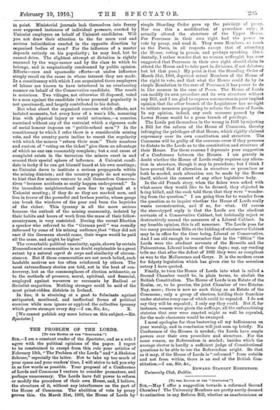THE PROBLEM OF THE LORDS.
[TO THE EDITOR OF TES "BPECTATOR."1
Srn,—I am a constant reader of the Spectator, and as a rule I agree with the political opinions of the paper. I regret to be constrained to except from this rule your articles of February 12th, " The Problem of the Lords" and "A Skeleton Scheme," especially the latter. Not to take up too much of your space and your readers' time, I will strive to tell you why in as few words as possible. Your proposal of a Conference of Lords and Commons I venture to consider premature, and perhaps unnecessary. The Lords have full power to reform or modify the procedure of their own House, and, I believe, the structure of it, without any interference on the part of the House of Commons. The abolition of vote by proxy proves this. On March 31st, 1868, the House of Lords by simple Standing Order gave up the privilege of proxy. Nor was this a modification of procedure only ; it actually altered the structure of the Upper House. For Peeresses in their own right had the power to vote by proxy, and used it. They were Members, as muck as the Peers, in all respects except that of attending the House, voting in person, and perhaps speaking. (Inci- dentally, I rather wonder that no woman suffragist has ever suggested that Peeresses in their own right should claim to attend the House and to take part in divisions, if not debates; but let that pass.) My point is that the Standing Order of March 31st, 1868, deprived actual Members of the House of the right to vote, and that what the House could do by its simple Resolution in the case of Peeresses it has power to do in like manner in the case of Peers. The House of Lords can modify its own procedure and its own structure without any Bill, and I am glad to express concurrence in your implied opinion that the other branch of the Legislature has no right to initiate measures purporting to reform the House of Lords. In my opinion, indeed, any such measure passed by the Lower House would be a gross breach of privilege.
The Lords put themselves in the wrong in 1831 by rejecting a Bill for the reform of the House of Commons, thereby infringing the privileges of that House, which rightly claimed supremacy over its own constitution and structure. The Commons will he guilty of the converse error if they presume to dictate to the Lords as to the constitution and structure of their House. For these reasons I deprecate your suggestion of a Conference between the Houses. I am gravely in doubt whether the House of Lords really requires any altera- tion in structure, though it may in procedure ; but I think I have proved that if alteration in structure or procedure or both be needed, such alteration can be made by the House itself, without the consent of any other legislative body.
In the old French story, when the fishes were asked with what sauce they would like to be dressed, they objected to bring killed, and the cook told them that they were "wander- ing from the question." I am going thus far to wander from the question as to inquire whether the House of Lords really wants reconstruction, and if so, for what. Of course the stereotyped reply is that the Lords are the obedient servants of a Conservative Cabinet, but habitually reject or destructively amend the measures of a Liberal Cabinet. In my humble opinion, this is all nonsense. The Lords pass far too many pernicious Bills at the bidding of whatsoever Cabinet may be in office for the time being, Liberal or Conservative. And I am old enough to remember that in the "fifties " the Lords were the obedient servants of the Russells and the Palmerstons, Liberal leaders of those days ; nay, my reading tells me that after the defeat of 1832 they were as compliant as wax to the Melbournes and Greys. It is the modern craze for fidgety legislation which has given rise to the senseless outcry I have quoted.
Finally, to turn the House of Lords into what is called a Second Chamber would be, in plain terms, to abolish the British Constitution. The House of Lords is an Estate of the Realm, or, to be precise, the joint Chamber of two Estates. Nay, more ; there is now no such thing as an Estate of the Commons ; only a group of electors, holding their franchise under statutes every one of which could be repealed. I do not say they will be repealed ; I only say they could. But if, for instance, women were given the suffrage, all the enfranchising statutes that ever were enacted might as well be repealed, for the male electorate would be swamped.
I must apologise for thus bestowing all my tediousness on your worship, and in conclusion will just sum up briefly. No Conference of the Houses is needed; the Lords have ample powers over their own procedure and structure. For the same reason, no Referendum is needed ; besides which the average elector is hardly a. sufficient judge of Constitutional questions to be able to use the Referendum aright. Be that as it may, if the House of Lords is " reformed " from outside and not from within, there is an end of the British Con- stitution.—I am, Sir, &c.,
EDWARD STANLEY ROBERTSON.
University Club, Dublin.








































 Previous page
Previous page